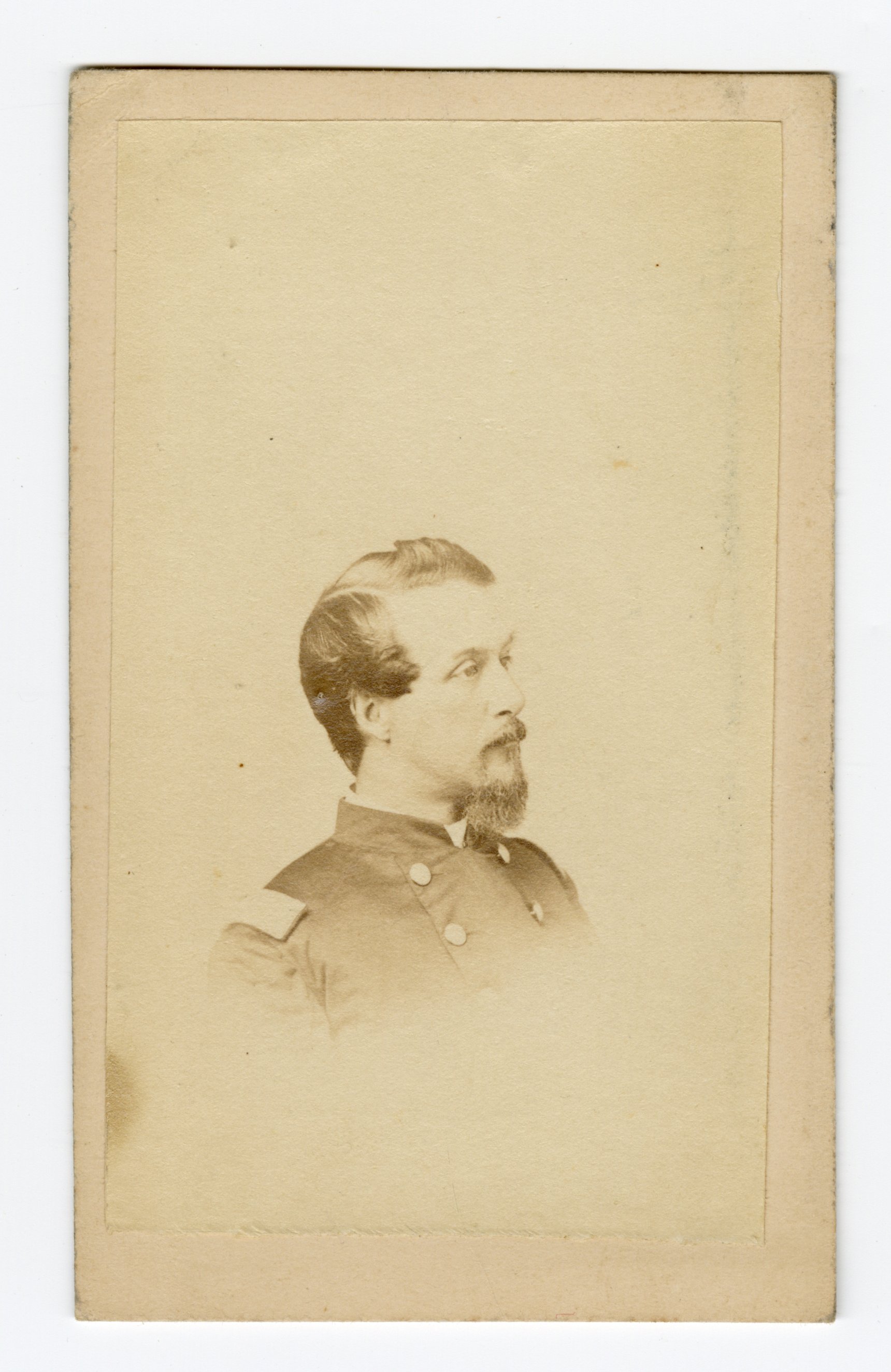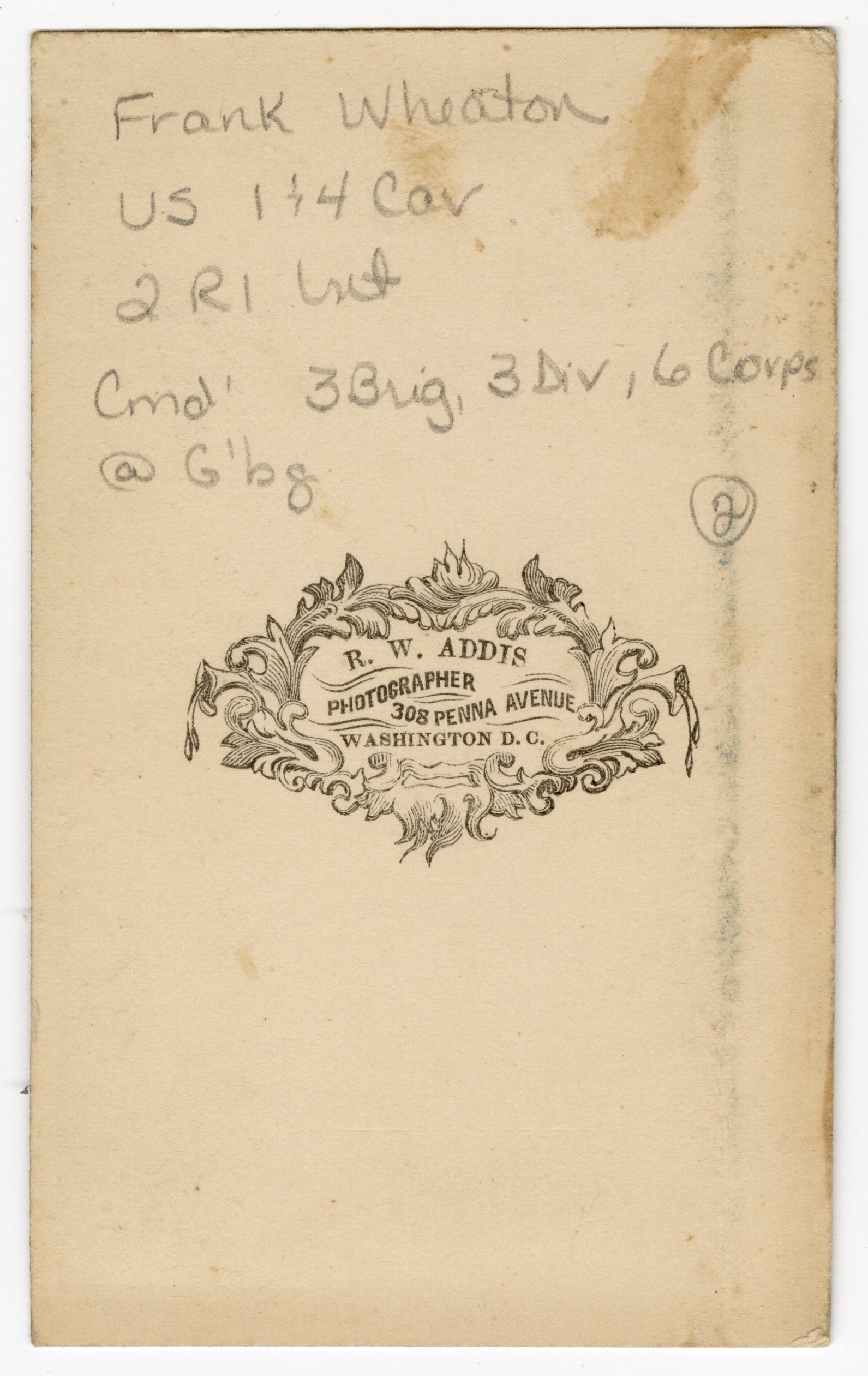2nd Rhode Island Infantry - Gettysburg Brigade Commander
Item CDV-10835
Frank Wheaton
Price: $650.00
Description
Frank Wheaton, brigadier general, was born in Providence, Rhode Island, May 8, 1833. He received his early education at the public schools of Providence and became a surveyor. He went to California in 1850, and was employed as a civil engineer on the Mexican boundaries. In 1855 he was commissioned first lieutenant in the 1st U. S. Cavalry, serving in Kansas and Missouri. He was in the engagement with the Cheyenne Indians at Wood's River, near Fort Kearny, Nebraska, in 1855, at Solomon's Fork in 1857, and in the expedition against the Mormons in1858.
In March, 1861, he received promotion to the rank of captain. He was on recruiting service in the East when the 2ndRhode Island Infantry was mustered into the U. S. service in July, 1861, and he accepted a commission as lieutenant colonel of the regiment, being in the same month made colonel. He fought in the first battle of Bull Run, served during the Peninsular and Maryland campaigns, and was promoted brigadier general of volunteers in November 1862.
When the Civil War started, Wheaton was commissioned as lieutenant colonel of the 2nd Rhode Island Infantry on July 10, 1861. His father-in-law from his first marriage, General Samuel Cooper, was the ranking general for the Confederacy, whereas Wheaton fought for the Union. Wheaton's unit fought at the First Battle of Bull Run, where its commander, Col. John Slocum, was killed. Wheaton took command of the unit, was promoted to colonel effective July 21, 1861, and led the 2nd Rhode Island during the Peninsula Campaign, where he was commended for his actions at the Battle of Williamsburg. At the Battle of Antietam, the regiment was kept in the rear and out of the battle.
On November 29, 1862, Wheaton was promoted to brigadier general of volunteers and placed in command of the 3rd Brigade (62d NY, 93d Pa, 98th Pa, 102 Pa & 139 Pa), 3rd Division, VI Corps. He led them in heavy fighting at the Battle of Chancellorsville. His brigade, under the command of Colonel David J. Nevin of the 62nd New York, was the only brigade of the VI Corps to see action on the afternoon of the second day of the Battle of Gettysburg after completing a forced march of approximately 30 miles from Manchester, Maryland that day. At Gettysburg he commanded the 3rd Division while its commander, Maj. Gen. John Newton, temporarily commanded the I Corps, in place of John F. Reynolds.
Wheaton remained in command of the brigade during Lt. Gen. Ulysses S. Grant's Overland Campaign in 1864, as well as during the subsequent Siege of Petersburg. His men were hurried by train to Washington, D.C., in time to help repel Jubal Early's raid on the capital. During the ensuing operations in the Shenandoah Valley, under Maj. Gen. Philip Sheridan, Wheaton was promoted to command of the first division after Brig. Gen. David Allen Russell was killed at the Third Battle of Winchester. His division fought well in subsequent battles. In the Battle of Sailors Creek Virginia, on April 6, 1865, his division captured Confederate Major General George Washington Custis Lee, son of Robert E. Lee. After the return of VI Corps to the Petersburg front, Wheaton earned the brevet rank of major general in the volunteer army and was brevetted colonel in the regular services.
He received the brevet of major general of volunteers for gallant and meritorious service at the battles of Winchester, Fisher's Hill, and Middletown, Virginia, and brevets in the regular army to the grade of major general for the battles of the Wilderness, Cedar Creek and Petersburg, respectively. General Wheaton was promoted in the regular army to major of the 2nd cavalry Nov. 5, 1863; Lieutenant Colonel of the 39th infantry July 28, 1866; transferred to the 21st infantry March 15, 1869; colonel of the 2nd infantry December 15, 1874; brigadier general in 1892 and assigned to the command of the Department of Texas with headquarters at San Antonio. He was retired May 8, 1897, and died at Washington, DC, June 18, 1903.
Source: The Union Army, vol. 8 and Wikipedia


